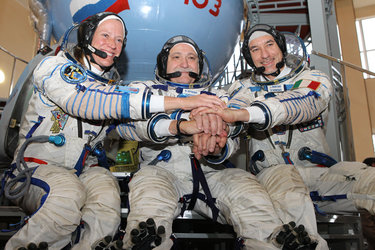Accept all cookies Accept only essential cookies See our Cookie Notice

About ESA
The European Space Agency (ESA) is Europe’s gateway to space. Its mission is to shape the development of Europe’s space capability and ensure that investment in space continues to deliver benefits to the citizens of Europe and the world.
Highlights
ESA - United space in Europe
This is ESA ESA facts Member States & Cooperating States Funding Director General Top management For Member State Delegations European vision European Space Policy ESA & EU Space Councils Responsibility & Sustainability Annual Report Calendar of meetings Corporate newsEstablishments & sites
ESA Headquarters ESA ESTEC ESA ESOC ESA ESRIN ESA EAC ESA ESAC Europe's Spaceport ESA ESEC ESA ECSAT Brussels Office Washington OfficeWorking with ESA
Business with ESA ESA Commercialisation Gateway Law at ESA Careers Cyber resilience at ESA IT at ESA Newsroom Partnerships Merchandising Licence Education Open Space Innovation Platform Integrity and Reporting Administrative Tribunal Health and SafetyMore about ESA
History ESA Historical Archives Exhibitions Publications Art & Culture ESA Merchandise Kids Diversity ESA Brand Centre ESA ChampionsLatest
Space in Member States
Find out more about space activities in our 23 Member States, and understand how ESA works together with their national agencies, institutions and organisations.
Science & Exploration
Exploring our Solar System and unlocking the secrets of the Universe
Go to topicAstronauts
Missions
Juice Euclid Webb Solar Orbiter BepiColombo Gaia ExoMars Cheops Exoplanet missions More missionsActivities
International Space Station Orion service module Gateway Concordia Caves & Pangaea BenefitsLatest
Space Safety
Protecting life and infrastructure on Earth and in orbit
Go to topicAsteroids
Asteroids and Planetary Defence Asteroid danger explained Flyeye telescope: asteroid detection Hera mission: asteroid deflection Near-Earth Object Coordination CentreSpace junk
About space debris Space debris by the numbers Space Environment Report In space refuelling, refurbishing and removingSafety from space
Clean Space ecodesign Zero Debris Technologies Space for Earth Supporting Sustainable DevelopmentLatest
Applications
Using space to benefit citizens and meet future challenges on Earth
Go to topicObserving the Earth
Observing the Earth Future EO Copernicus Meteorology Space for our climate Satellite missionsCommercialisation
ESA Commercialisation Gateway Open Space Innovation Platform Business Incubation ESA Space SolutionsLatest
Enabling & Support
Making space accessible and developing the technologies for the future
Go to topicBuilding missions
Space Engineering and Technology Test centre Laboratories Concurrent Design Facility Preparing for the future Shaping the Future Discovery and Preparation Advanced Concepts TeamSpace transportation
Space Transportation Ariane Vega Space Rider Future space transportation Boost! Europe's Spaceport Launches from Europe's Spaceport from 2012Latest

Expedition 60 crew
Thank you for liking
You have already liked this page, you can only like it once!
ESA astronaut Luca Parmitano was launched to the International Space Station from the Baikonur cosmodrome in Kazakhstan alongside NASA astronaut Andrew Morgan and Roscosmos commander Alexander Skvortsov on Saturday 20 July 2019. The trio orbited Earth four times in their Russian Soyuz MS-13 spacecraft before docking to the Station six hours and 20 minutes later at 00:48 CEST Sunday 21 July.
This clip shows a few of the highlights from the lead-up to launch through to docking.
Luca and his crew mates were welcomed to the Station by NASA astronauts Christina Koch and Nick Hague and Russian cosmonaut and current Space Station commander Alexei Ovchinin when the Soyuz hatch opened at 03:04 CEST on 21 July. This marked the start of Expedition 60 and Luca's second space mission 'Beyond'.
Luca will support more than 50 European experiments as well as over 200 international experiments. These include investigations into how aspects of the human body are affected by microgravity and how astronauts could control robots remotely during lunar exploration.
When Alexei Ovchinin departs the Space Station at the end of Expedition 60, Luca will also take on the role of Space Station commander for Expedition 61. This is the third time a European astronaut and the first time an ESA astronaut from Italy has held this position. Luca will follow ESA astronauts Frank De Winne (2009) and Alexander Gerst (2018) when he takes command later this year.
-
CREDIT
ESA -
LICENCE
ESA Standard Licence

Beyond mission launch

Expedition 36 Crew

Expedition 36/37 crew

Expedition 36/37 crew















 Germany
Germany
 Austria
Austria
 Belgium
Belgium
 Denmark
Denmark
 Spain
Spain
 Estonia
Estonia
 Finland
Finland
 France
France
 Greece
Greece
 Hungary
Hungary
 Ireland
Ireland
 Italy
Italy
 Luxembourg
Luxembourg
 Norway
Norway
 The Netherlands
The Netherlands
 Poland
Poland
 Portugal
Portugal
 Czechia
Czechia
 Romania
Romania
 United Kingdom
United Kingdom
 Slovenia
Slovenia
 Sweden
Sweden
 Switzerland
Switzerland
























